Data refers to the first half of 2025


Publication date: September 2025

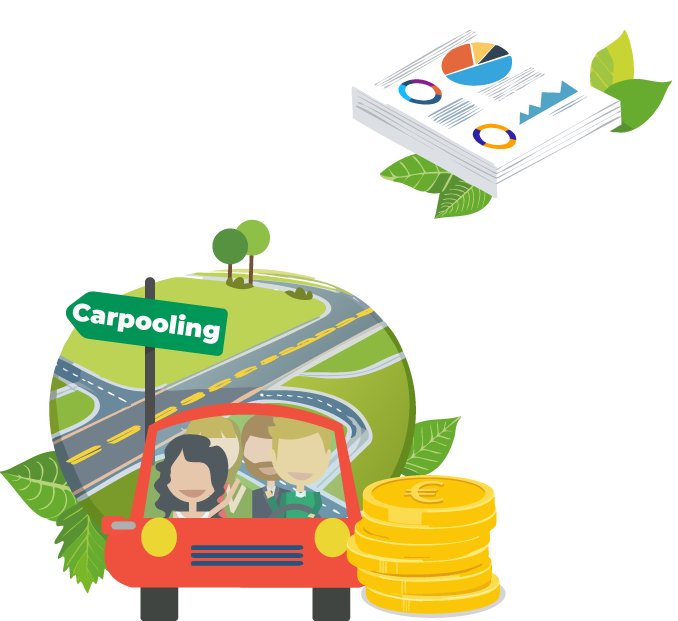

Precisely in light of these changes, Jojob publishes its new “Companies on the Move Observatory 2025.”, showing how the use of corporate carpooling is evolving in Italy. Corporate carpooling is indeed one of the most effective—and easily implementable at the company level—solutions that can promote Mobility Manager.
Thanks to Jojob’s platform and app, employees can share their daily home-to-work (and also home-to-university) commute with compatible drivers and passengers (colleagues or employees from nearby companies), reducing the number of vehicles on the road and, consequently, CO2 emissions. Furthermore, users can quantify their contribution to the environment in terms of reduced environmental impact, economic savings, and benefit from dedicated recognition and rewards. A solution that does not require new infrastructure and integrates with public transport for those who need to make commuter trips, especially over long distance, for example to reach company facilities, particularly if located outside urban areas.
The success of this model is demonstrated by the numbers from the Companies on the Move Observatory 2025. carried out by Jojob Real Time Carpooling: in the first half of 2025, the commitment of home-to-work and home-to-university commuters using Jojob and sharing their cars for daily trips produced record results. The number of shared trips increased by 55% compared to the same period last year, reaching 450,305, a figure that translates into 258,383 ewer cars on the roads.
The positive environmental impact is even more pronounced: CO₂ saved jumped 69.5% compared to the first half of 2024, reaching almost 946 tons not emitted into the atmosphere—a weight equivalent to that of 140 elephants. Similarly, kilometers avoided thanks to vehicle sharing totaled 7,275,286, an increase of 70%.
The most significant figure for users, in a context of growing attention to costs, is the direct economic savings. The Jojob community saved a total of €1,454,005 in transportation expenses, a 70.5% increase, demonstrating how sustainability can also translate into a tangible economic benefit.
1 An adult African elephant weighs on average about 6,800 kg

Data referring to the first half of 2025



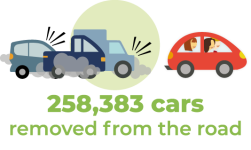
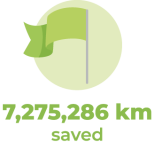
Data refers to the first half of 2025

The 2025 Companies on the Move Observatory by Jojob focuses on providing an overview of companies that choose to implement this sustainable mobility solution.
In 2025, 2,697 company locations are served in Italy, involving 173,384 employees in Jojob’s corporate carpooling service. Considering only the data from participating companies, in the first half of 2025 there were 404,882 shared trips, corresponding to economic savings for employees using the service of €1,408,636 and over 917 tons of CO₂ not emitted into the atmosphere.
Analyzing the size of companies using the corporate carpooling service in Italy, it emerges that car sharing for the home-to-work commute is a cross-cutting solution, adopted particularly effectively by small and medium-sized enterprises (SMEs). Company locations with 100 to 250 employees represent the largest cluster, accounting for 48.4% of the total. They are followed by companies with 250 to 500 employees, making up 22.7%, demonstrating how this size category recognizes the benefits of shared mobility both for the environment and for employee well-being.
Large companies, with over 500 employees per location, account for nearly a third of the sample (29%). Specifically, 14% are locations with 500–1,000 workers and 12.2% with 1,000–2,000 employees. The presence of large industrial and managerial hubs with over 2,000 employees (2.7%) is also significant, confirming that sustainable mobility practices have become strategic even for the most complex and structured companies.
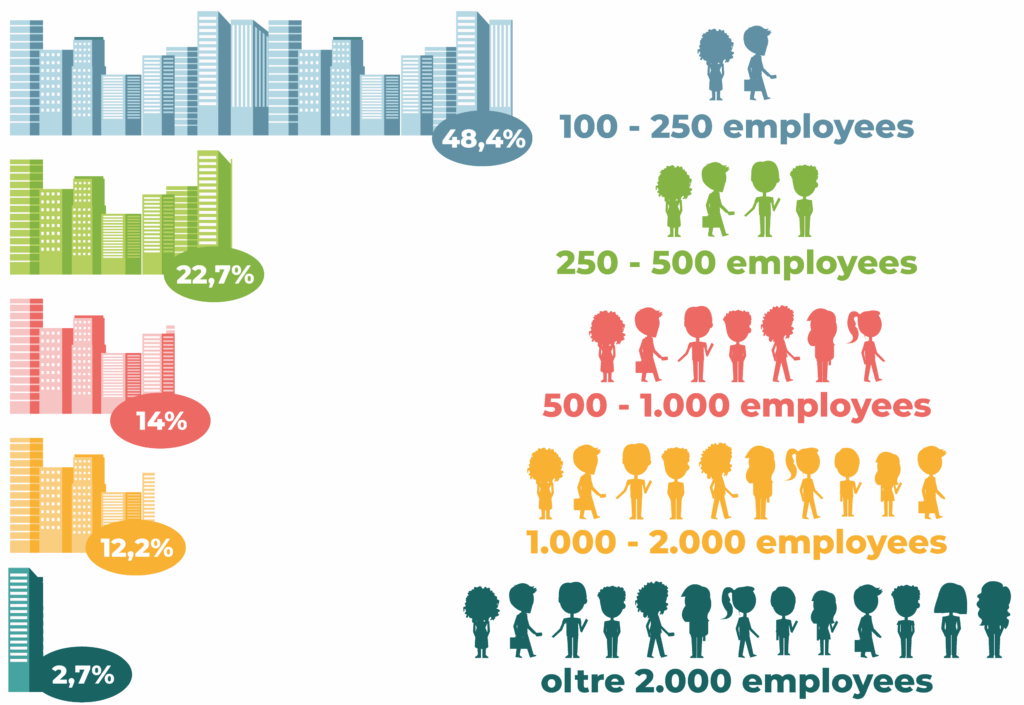

Who are the champions of corporate carpooling in Italy? The Companies on the Move Observatory by Jojob reveals a landscape that combines two key aspects of the national productive fabric: large industrial hubs and extensive service networks.
Driving the shared mobility revolution is the metalworking sector, which ranks first in terms of employees involved, accounting for 24.6% of the total. Alongside logistics (9.9%) and food (8.4%), it forms a podium highlighting the decisive impact of carpooling for employees of large facilities, often difficult to reach by public transport.
Adoption by the banking sector also stands out. Although it is the second sector by number of employees (17.7%), it covers 79% of all active locations, demonstrating how carpooling has become a widespread and far-reaching sustainability tool even in the tertiary sector. This dual approach confirms the flexibility of the Jojob model, capable of generating value both for large industrial plants and for networks of offices and branches distributed across the country.

Considering usage data, the Jojob Observatory clearly reveals who the protagonists of sustainable mobility in Italy are. Leading the ranking is the metalworking sector, whose employees completed 192,656 carpooling trips. This commitment translates into tangible and measurable benefits: 472 tons of CO₂ not emitted into the atmosphere, 3.6 million kilometers traveled in shared trips, and total economic savings of €726,000 for employees.
The numbers also tell a story of great efficiency for the logistics sector. Its employees, making 23,419 trips, managed to avoid 111 tons of CO₂ emissions and save €170,000. This demonstrates the strategic value of carpooling for “long-distance commuters” working in hubs and logistics centers, where each shared trip generates an even greater impact.
The ranking of the most virtuous sectors continues with luxury (36,779 trips), automotive (25,994), and food (24,803), confirming that carpooling is a concrete solution for the entire Italian productive fabric.

Jojob’s analysis also captures the regional distribution of company locations adopting carpooling in Italy, highlighting the most active regions and those still in the development phase for this mode of commuting.

Always considering the number of active locations, Lombardy confirms its position as the leading region in Italy, hosting 18.7% of all locations where carpooling is active. This primacy reflects its role as the country’s economic engine, with a dense entrepreneurial fabric and intense commuting flows, where sustainable mobility solutions become essential to ease traffic and improve workers’ quality of life.
Close behind is Emilia-Romagna, representing 16.6% of locations nationwide. In third place is Lazio, with 10.2% of locations—a figure strongly influenced by the presence of the capital, with its numerous companies, institutions, and challenges related to urban and extra-urban mobility.
Outside the podium, the ranking confirms the widespread adoption of the service in areas with high production capacity. Piedmont ranks fourth with 6.8% of locations, followed by Campania, which with 6.4% demonstrates that carpooling is an effective and appreciated solution even in the South. Next is Veneto, with 5.9% of active companies.
The top 10 listed by Jojob also includes Marche (4.9%), Tuscany (4.4%), Abruzzo (4.3%), and Puglia, which closes the ranking of the top ten regions with 4% of total locations, testifying to increasingly homogeneous adoption across the national territory.
When analyzing the direct involvement of employees, the ranking of the most virtuous regions paints an even clearer picture focused on the country’s major industrial hubs. Lombardy remains in first place, representing nearly one-fifth of all employees involved nationwide, with a share of 19.7%. This figure highlights how large companies in the region have embraced carpooling as a large-scale strategic welfare tool.
In second place—up one position compared to 2024—is Piedmont, with 16.7% of employees. This performance, higher than that of other regions with more active locations, indicates the presence of large plants, particularly in the automotive and metalworking sectors, where service adoption is massive. Closing the podium is Emilia-Romagna, which with 13.5% of employees confirms its consistent excellence both in terms of number of locations and participation.
Outside the podium, Lazio ranks fourth with 11.8% of employees, followed by Veneto (7.9%) and Campania (5.7%). The top 10 listed by Jojob is completed by Tuscany (5.2%), Liguria (4.7%), Friuli-Venezia Giulia (3.2%), and Puglia (2.3%). This distribution highlights how carpooling achieves its maximum impact where large pools of commuting workers are concentrated, typical of the industrial districts in the North, while also showing increasingly significant participation in the rest of Italy.

Analysis of average distances by region in the first six months of the year shows an unmistakable trend: carpooling trips are getting longer, reflecting an increasingly significant extra-urban commuting pattern. This also explains the difference between the growth in kilometers saved between the first half of 2025 and the same period in 2024 (+70%) and the growth in the number of trips, which stands at +55%. It means that, on average, each shared trip covers a greater distance, proving that corporate carpooling is becoming the most effective solution where local public transport is lacking or inefficient.
While the national average distance for a carpooling trip is 27.9 km, the Observatory highlights peak distances in regions where transport poverty is more pronounced. Notable examples include Molise, with an average trip length of almost 54 km, Sicily (50.5 km), and Sardinia (45.6 km), followed by regions such as Puglia (40.4 km), Abruzzo (39.2 km), and Lazio (34.1 km).
This snapshot confirms the role of corporate carpooling not only as a sustainability tool but also as a true social infrastructure, ensuring access to work and transforming a cost and inconvenience into an opportunity for savings and sharing.
At the provincial level, the corporate carpooling map reveals a clear leadership by the province of Rome, which, with 7.7% of active offices, stands as the main hub in Italy. This figure is driven by the concentration of large companies and institutions in the capital and by the well-known mobility challenges.
Right after, the industrial heart of Northern Italy emerges strongly: the province of Brescia ranks second with 4.5% of the offices involved, followed by Modena (4%), Milan (3.7%), Bergamo (3.3%), and Bologna (3.2%). This further demonstrates how carpooling represents a strategic solution for industrial districts, where commuting flows are particularly intense.
The top 10 is completed by strategic territorial areas such as Trento and Naples (both at 3.2%), Reggio Emilia (3%), and Turin (2.8%), reflecting a model that effectively meets the needs of both large metropolitan areas and manufacturing hubs.

Within the Companies on the Move Observatory, Jojob has also updated the profile of employees at companies using carpooling, to understand why they join and how they share their private cars for commuting.
Who is the typical carpooler using Jojob? First of all, they are a habitual commuter. Carpooling is not an occasional choice but a well-established routine: exactly half of users (50.4%) share their car 5 days a week, making it their primary commuting method. Adding those who do it 3 or 4 days a week (an additional 35.5%) paints the picture of a user who has fully integrated this practice into their daily life.
They are also a relatively new user, reflecting the rapid recent growth of the service: over half (52.6%) have been using it for just one year, and another 26.2% for two years. They are not just digital users, but people who have found in technology a solution to a real need. In fact, for more than a third of respondents (36.8%), the app was decisive in forming their carpool group, and for 27.6%, it sparked their first experience with carpooling.
The motivations driving them are highly pragmatic. While environmental awareness is a relevant factor (12%), the main reason for sharing a car is overwhelmingly financial savings, cited by nearly two out of three employees (63.1%). And this saving is tangible: when asked how they spend the money saved, the majority points to shopping (57%), followed by vacations and travel (18.6%).
The result is a clear profile: a person mindful of their finances, who leverages technology to find new travel companions and transforms commuting costs into purchasing power to improve their quality of life.
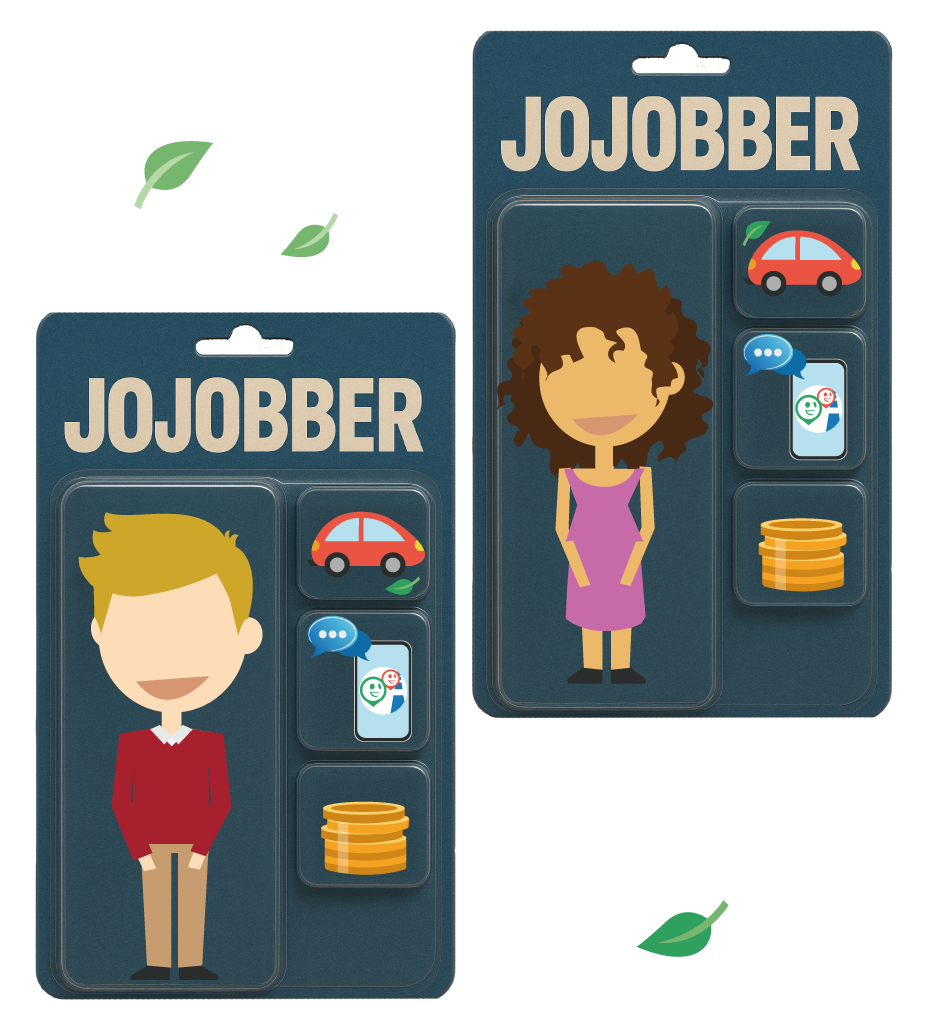
Jojob’s analysis finally reveals an interesting gap between the practice of sustainability and the knowledge of its formal terminology. Over 7 out of 10 users (73.4%) admit, for example, that they do not know the meaning of the acronyms ESG and SDGs, showing that adopting virtuous behaviors like carpooling does not stem from a theoretical understanding of sustainability frameworks. However, interest in the tangible impact of their actions is present, with 1 in 5 users (22.2%) actively monitoring the CO2 saved through carpooling using the data provided by the Jojob app.
This pragmatism is also reflected in the perception of institutional actors. While companies receive high marks, with over 77% of users recognizing them as active promoters of sustainable mobility (“very much” for 36.5% and “partially” for 40.9%), municipalities are mostly criticized. 39.1% of respondents believe their municipality does not commit to sustainable mobility, and another 37.5% consider it only partially engaged.

A clear picture thus emerges: the carpooler is a “practical environmentalist,” motivated and supported by their company, operating in a context where local public policies are still perceived as inadequate.
This confirms the importance of commitment from companies and Mobility Managers, who—thanks also to the increasingly positive response from employees—continue to remove thousands of cars from the roads every day, reducing emissions and traffic. The challenge is to make this model systemic, creating ever-larger networks among neighboring companies and demonstrating that investing in sustainable mobility is one of the most effective and tangible ways to achieve sustainability goals and improve quality of life for everyone.
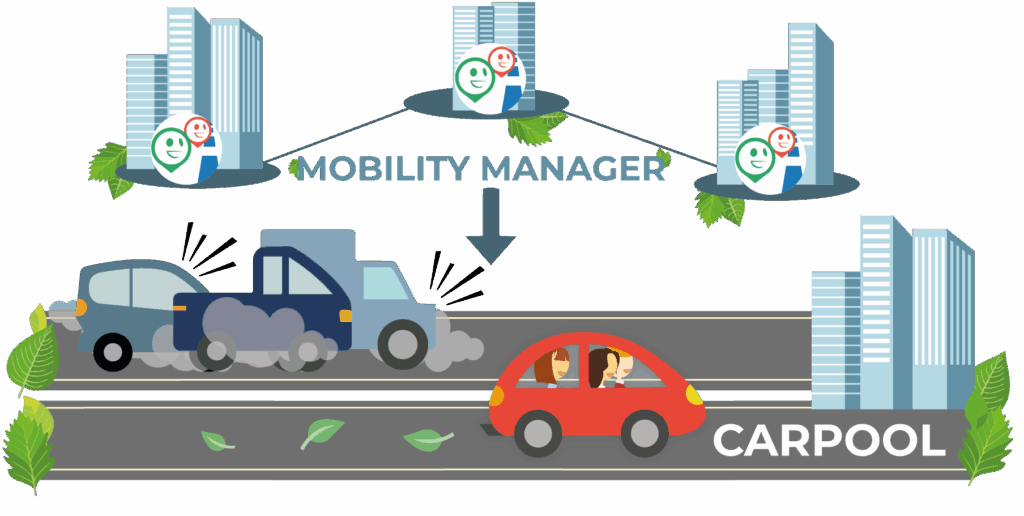

Stay updated!
Check out the Jojob Observatories archive


























Bringme Srl Società Benefit
Via Pier Carlo Boggio, 59 – 10138 Torino
P.IVA 10979400016
Share capital 23.658,73€ i.v
REA TO1177694
Jojob Real Time Carpooling is a project of:
